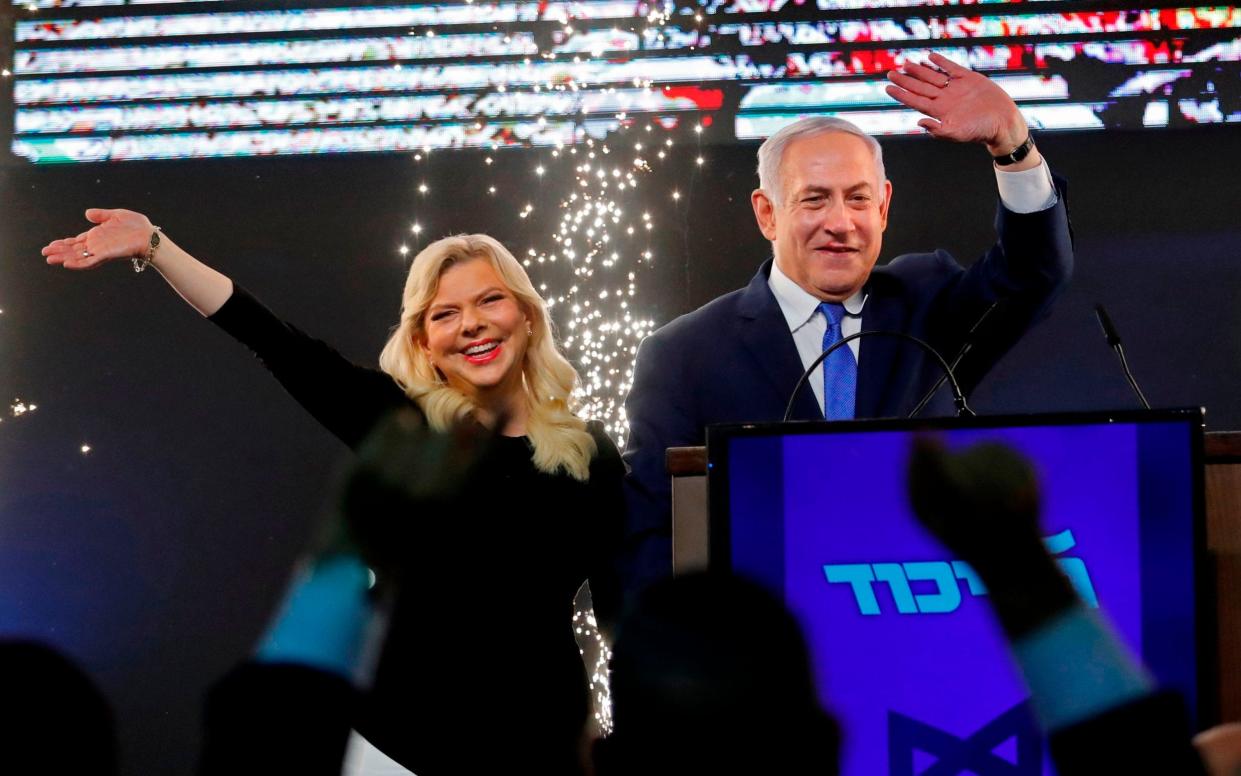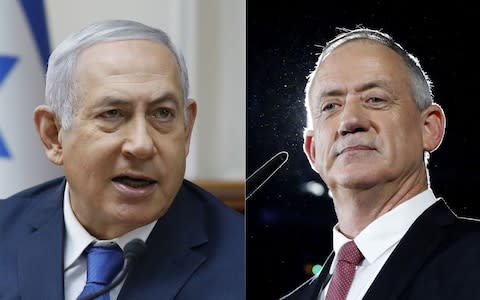Benjamin Netanyahu begins forming coalition as US hails prospects of Israeli-Palestinian peace

Benjamin Netanyahu yesterday began negotiations to form a new Right-wing coalition after seeing off a centrist challenger in a close election and securing a fifth term as Israel’s prime minister.
Mr Netanyahu’s Likud party won the same number of seats as Blue & White, a centrist coalition led by former general Benny Gantz, but the victory of other Right-wing parties gave the prime minister a clear path to a majority government.
“I already began talks with the leaders of the Right-wing parties, our natural partners,” Mr Netanyahu told his cheering supporters in Tel Aviv. “I intend to finish the work quickly, with the aim of forming a stable national government.”
The result was hailed by Donald Trump, who said the prime minister’s victory meant “a better chance” for peace between Israelis and Palestinians, but was met with dismay by Palestinians.
The election will cement Mr Netanyahu’s reputation as the most successful election-winner in Israeli history and prove that his brand of divisive Right-wing politics is the country’s dominant political force.
The 69-year-old has been in power for 13 years and is now on course to overtake David Ben Gurion, Israel’s founding father, as the country’s longest-serving prime minister.
Despite his election success, Mr Netanyahu is still facing criminal corruption charges that have the potential to drive him from office by the end of the year. Opponents suspect he will use his new majority to try to pass an immunity law to shield himself from prosecution.
Mr Netanyahu, known in Israel as “Bibi”, denies all wrongdoing and claims the prosecutions are part of a politically-motivated witch hunt against him and his family.

That explanation appeared to satisfy a majority of Israeli voters, who cast their ballots for parties committed to keeping Mr Netanyahu in power.
“I know some of the things Bibi did are wrong but I’m not looking for a rabbi. I’m looking for a leader,” said Yaakov Lemash, 76, after voting for Likud.
Mr Netanyahu’s Likud and Mr Gantz’s Blue & White each appeared to have won 35 seats in Israel’s 120-member parliament. But while Likud and the Right-wing parties had a clear route to a majority, Mr Gantz did not have enough allies on the Centre-Left.
The former general, who rose from a commando to the head of Israel’s military, conceded the election on Wednesday evening. But his party said it was already gearing up to fight another election next year if the criminal case against Mr Netanyahu drives him from office
Speaking at the White House, Mr Trump praised Mr Netanyahu as a friend and ally.
"I never made it a promise but everybody said you can’t have peace in the Middle East with Israel and the Palestinians," Mr Trump said. "I think we have a chance and I think we have now a better chance with Bibi having won.”
The president handed Mr Netanyahu a major pre-election boost by recognising Israel’s annexation of the Golan Heights two weeks before polling day.
The White House has said it will release its Israeli-Palestinian peace plan, referred to as “the Deal of the Century” sometime after the Israeli elections.
Skeptics question whether the long-awaited plan will ever be released, as it has been pre-emptively rejected by the Palestinians and may cause political difficulties for Mr Netanyahu and America’s Arab allies.
“I never made it a promise”pic.twitter.com/Npi6wDwQJ6
— Noa Landau נעה לנדאו (@noa_landau) April 10, 2019
Hanan Ashrawi, a Palestinian official, said Israelis “overwhelmingly voted for candidates that are unequivocally committed to entrenching the status quo of oppression, occupation, annexation and dispossession in Palestine”.
The next step in the election is for Israel’s president, Reuven Rivlin, to summon party leaders for consultations before formally announcing next week who will be tasked with forming a government.
Mr Netanyahu’s potential coalition partners began publicly announcing their demands in return for joining the government. One small Right-wing party demanded two ministerial posts, while another called for a harder line against Hamas in Gaza.
Israel’s two ultra-Orthodox parties increased their standing from 13 to 16 seats, giving them more sway within a future coalition.
The parties are focused on budgets for religious communities but also on preventing public transportation on Shabbat, the Jewish holy day, and blocking a compromise to allow more liberal Jews space at the Western Wall.
Mr Netanyahu was dogged throughout his last term by Naftali Bennet and Ayelet Shaked, two ambitious young ministers from a hardline conservative party who perpetually assailed the prime minister from his Right.
In a disastrous political miscalculation, Mr Bennett and Ms Shaked’s new party looked like it failed to pass the minimum vote threshold, leaving both of them without ministries or even parliamentary seats.

